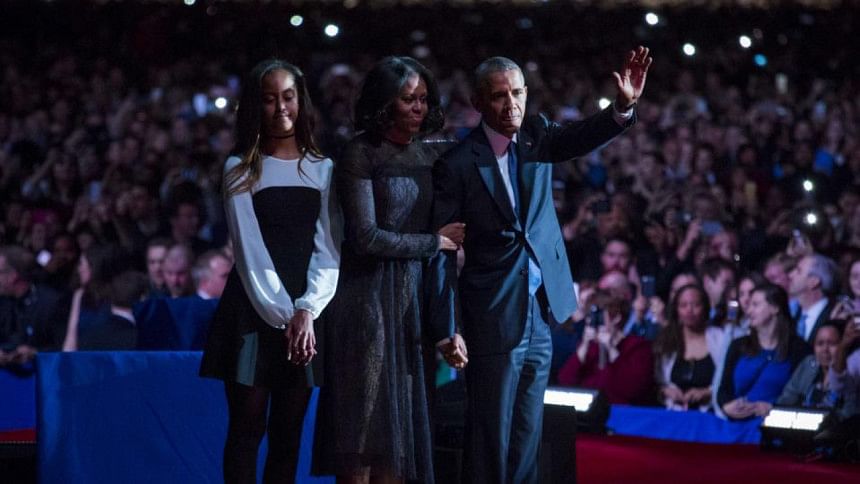Goodbye, Barack Obama

All good things must come to an end, but some things leave us with a lingering "feelgood" emotion. Such was the Presidency of Barack Obama. His legacy will be judged by history, but, even his critics cannot deny that Obama was a consequential President. As he leaves the White House, we can testify to his many successes: managing a recovery from the recession that he inherited; introducing a universal health care system that provided insurance to millions of Americans; winding down US involvement in foreign wars; combating international terrorism without engaging in religious stereotyping; building a worldwide consensus on environment. All these contributions notwithstanding, President Obama was also a conscientious and intelligent leader who espoused humane values and inspired millions because of the dignity and gravitas with which he conducted his presidency. These qualities seem all the more striking when viewed in contrast to the overbearing, bullish style of his successor.
Obama has received severe criticism on the lapses in his presidency — increased drone attacks, expansive surveillance of American citizens, failure to enact a comprehensive immigration reform and closure of the Guantanamo detention facility. Most importantly, he is held responsible for not dealing effectively with the upheaval in the Middle East, particularly for not preventing the human tragedy in Syria. If Obama was too interventionist for some, he wasn't interventionist enough for his detractors. But we cannot but admire his landmark achievement in forging an agreement with Iran despite persistent war cries from hawks in the administration. Obama pursued a path of assertive diplomacy over aggression as is demonstrated by his action in ending the five decade old isolationist policy against Cuba.
Perhaps one of the most remarkable aspects of the Obama presidency has been that he achieved what he did despite strong resistance from a hostile Republican Congress and vicious racist attacks (led by Donald Trump) that questioned his citizenship and legitimacy as president. Yet he conducted himself with tremendous restraint encouraging his supporters to "resist the temptation to fall back on the same partisanship and pettiness and immaturity that have poisoned our politics for so long."
At a personal level, while campaigning for candidate Obama in 2008, I was truly inspired by his message of change. I believed in it because of the glimmer of hope I saw in the eyes of the black boy accompanying his volunteer mother to the campaign office, or in the little white girl who jumped with joy when she saw Barack Obama appear in a rally. My faith in the Obama optimism "yes we can" was reiterated by the men and women who responded to my door to door calls with hope written across their faces. When an elderly white woman opened her door and assured me that she and her husband would vote for the "black guy" I believed that the racist fabric of American society had been replaced by a multicoloured tapestry of tolerance and open-mindedness….
Unfortunately, today, I have been hit by the sad truth that Obama's leadership has failed to usher in a post-partisan and post-racial America that many of us dreamed of. He leaves behind a divided nation and a successor, whose reckless, insensitive demeanour has raised doubts about his ability to heal the wounds of the most acrimonious election in US history. But, despite the tarnished hopes of a post- racial age and the uncertainty of the continuation of his legacy, in his farewell speech Barack Obama defended his belief that the democratic process can empower citizens to change the course of nations. He urged people to be vigilant, relying, "not in my ability to bring about change — but in yours."
It would be unfair to write a piece on Barack Obama without shedding some light on the "man Obama" who has been voted as America's "most admired" for nine straight years (Gallup). One cannot help but wonder how Obama continues to maintain a cool, dignified demeanour despite all the unjust, nasty attacks from racists and Republicans. According to a recent article ("Obama's Secret to Surviving the White House Years — Books", NY Times, January 16, 2017) during his tenure in the White House, "books were a sustaining source of ideas and inspiration" for the president, and gave him "the ability to slow down and get perspective". In particular, Shakespearean tragedies played a crucial role in helping him understand "how certain patterns repeat themselves and play themselves out between human beings." Ironically, if we are to follow this line of thinking we may now need to brace ourselves for a Macbethan (or Trumpian) era where ambition, unchecked by moral constraints, leads to destruction and chaos.
But …we may still wake up from this "midwinter nightmare" and discover that all is not lost. Many of us who found comfort in Barack Obama's inclusive approach toward minorities and the underprivileged must continue to believe in his core message of hope. "Hope in the face of difficulty. Hope in the face of uncertainty. The audacity of hope." (Barack Obama, Democratic National Convention speech, 2004)
As we bid farewell to the first African American president of the United States, let us salute him in humble recognition of the fact that despite the strong headwinds he encountered, he performed his duties with tremendous dignity, unshakeable fortitude and remarkable class.
You did us proud.
The writer is a renowned Rabindra Sangeet exponent and a former employee of the World Bank.
E-mail: [email protected]

 For all latest news, follow The Daily Star's Google News channel.
For all latest news, follow The Daily Star's Google News channel. 



Comments